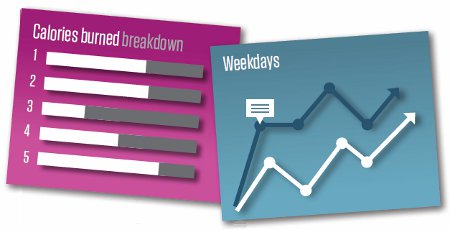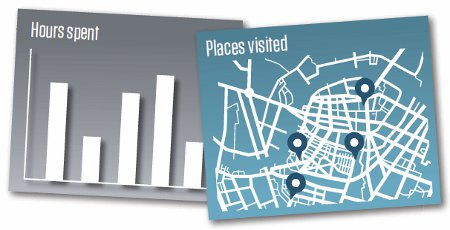Submitted by: Olivia Solon
Posted: 12/07/2012 Will analysing
your own data help
make you more
efficient or lead
a more productive
and enjoyable life?
Olivia Solon enters
the fascinating, if
slightly scary, world
of self-hacking.
Will analysing
your own data help
make you more
efficient or lead
a more productive
and enjoyable life?
Olivia Solon enters
the fascinating, if
slightly scary, world
of self-hacking.
Wherever we go, we leave
a tantalising ‘breadcrumb
trail' of data in our wake.
The combination of
carrying around a personal
tracking device – our mobile phone – and the
migration of tools and services online means,
whether we like it or not, we're generating data
with every interaction. Our spending habits,
our location, our running patterns, the number
of friends we have on social networking sites
– all of these contribute to this digital residue.
And now a new breed of easy-to-use
analysis tools is springing up to allow us to
take control of, aggregate and make sense
of the data we generate.
On a very simple level, self-hacking can be
about using an app such as RunKeeper, which uses GPS to plot how far you run and allows
you to compare your performance to previous
days. However, it becomes more interesting
when you pull in multiple data streams across
different areas of your life.
That's where personal analytics platform
Tictrac comes in – it lets you include data
from Facebook, Twitter, Google, Foursquare,
LinkedIn, RunKeeper, Withings wi-fi-enabled
weighing scales, Fitbit, sleep monitors,
calendars – even the weather – into a single
dashboard, helping you identify trends so that
you might make better life decisions.
Founder and CEO of Tictrac, Martin
Blinder, says: “We believe there's value in
providing people with a dashboard of their
‘current state of affairs' – a single place where
they can review the latest stats about their different online activities, from check-ins to
email, their current weight to today's lunch
spend. By just having one's activity data in one
place, users can immediately understand how
they are doing at any given time.”
One example might be comparing your
running patterns to your work diary and
your weight (as measured by your wi-fi scales).
While it might be obvious that if you eat too
much and move too little you'll fill out a bit,
Tictrac lets you track down which factor could
be causing the weight gain. It might turn out
that even though you're running more than
normal, you've put on weight because you've
been to more business lunches than usual.
Another example might be comparing your
blood pressure to the number of emails you
receive and meetings you have, or your home
energy use to your sleeping patterns.
As Blinder explains: “We believe users can
uncover more about themselves by crossing
this data. They can also learn how ancillary
information, such as the weather and seasons,
affect their behaviour or mood.”
 Practical uses
Practical uses
Health and fitness seem to be driving the
self-hacking agenda, especially as it's an area
in which we're used to counting calories,
reps and heart rate, and using pedometers. It
is somewhat hamstrung, however, by the fact
that one of the primary measures in this sphere
– the food intake – still requires manual input.
Until we can implant a chip in our mouths or
stomachs that continually monitors what we
consume it will be a bit of a hassle to get the
full picture. There is technology that can help,
for example the iPhone app Meal Snap, which
can identify food items from a photo of their
meal and estimate calorie content.
However, a burgeoning area for selfhacking
– or, should we say, self-hacking by
proxy – is child development. Parents can now
buy baby monitors that count how many times
a baby cries and for how long. This data can
be compared to the size, weight and age of the
child and the illnesses it gets. However, it could
pave the way for a somewhat terrifying future
of pushy parenting, where mums and dads can
pit their children against each other in terms
or academic or athletic performance.
This level of data analysis can also be useful
in the commercial space with ‘one-to-many'
relationships, such as doctors and their
patients, teachers and students and parents
and children. Furthermore it can be used
by consumer brands as a means of market
research. Part of Tictrac's business model is to
have companies pay people to monitor certain
parts of their lives, and so harness the platform
as a distributed market research panel.
There are, however, a number of potential
challenges for self-hacking. The first is that
we humans aren't entirely rational, and won't
always make lifestyle decisions based upon
statistics – no matter how compelling.
A more major concern is privacy. A single
online store for all of this personal data could
be enormously valuable not only to companies,
but to more unscrupulous people who could
capitalise on the knowledge of your exact
location and lifestyle patterns. For this reason
the encryption and management of this data
is of great importance. Many self-hackers like
the idea of a personal data store housing all the
data you generate on the web, combined with
a personal Application Programming Interface.
An API is a set of digital building blocks used
by companies seeking to keep ownership of
their data while allowing others to access it
and build tools and services on top of it.
Theoretically, this sort of platform could
allow us to retain control over our personal
data and give different organisations different
permissions to use it. For example, you might
be willing to trade your sleeping-pattern data
for a fee with a bed manufacturer, but not
your age, weight or eating habits. Currently,
a comprehensive permissions-based system
does not exist, although it is the subject of
research at Stanford, Nottingham and
Cambridge universities.
Once we claw back our data from large
organisations, there is a possibility that we
could turn it to our financial advantage. As
Derek McAuley, Professor of Digital Economy
at the University of Nottingham, says: “Cloud
service providers such as Google mine data
for value. The question remains as to whether
the consumer is getting good value. Perhaps
Google should pay me $25 a month to host my
email because of the value they extract.”